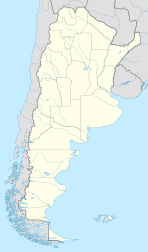San Francisco de Tilcara (usually referred to as Tilcara) is a city in the province of Jujuy, Argentina, and the head town of the Tilcara Department. It had 6,249 inhabitants at the 2010 census [INDEC]. Traces of human habitation in the area date back more than 10,000 years, making it one of the oldest continuously inhabited settlements of Argentina.
San Francisco de Tilcara | |
|---|---|
 | |
| Coordinates: 23°34′S 65°22′W / 23.567°S 65.367°W | |
| Country | |
| Province | |
| Department | Tilcara |
| Government | |
| • Mayor | Ricardo Romero (PJ) |
| Area | |
• Total | 1.2 km2 (0.5 sq mi) |
| Elevation | 2,465 m (8,087 ft) |
| Population (2010 census) | |
• Total | 6,249 |
| • Density | 5,200/km2 (13,000/sq mi) |
| Demonym | tilcareño/a |
| Time zone | UTC−3 (ART) |
| CPA base | Y4624 |
| Dialing code | +54 388 |
Tilcara is located 84 km from the provincial capital, San Salvador de Jujuy, beside National Route 9, at about 2,500 m above sea level, well within the first heights of the Andes.
The area features dramatic mountainous landscapes and rich aboriginal traditions, which make it a major tourist attraction in northwestern Argentina, with several nearby hiking tracks also attracting visitors.
Possibly the biggest attraction in Tilcara is the nearby Pucará de Tilcara, the partially reconstructed ruins of a pre-Inca pukara, Quechua for "fortress",[1] located a few kilometers away from the city of Tilcara on a hill with an impressive view of the valley of the Río Grande.
-
Calle de Tilcara
-
Jardín Botánico de Altura
Geography
editClimate
edit| Climate data for Tilcara (1934-1990) | |||||||||||||
|---|---|---|---|---|---|---|---|---|---|---|---|---|---|
| Month | Jan | Feb | Mar | Apr | May | Jun | Jul | Aug | Sep | Oct | Nov | Dec | Year |
| Daily mean °C (°F) | 17.1 (62.8) |
16.6 (61.9) |
15.6 (60.1) |
13.0 (55.4) |
9.9 (49.8) |
7.5 (45.5) |
7.1 (44.8) |
9.3 (48.7) |
11.7 (53.1) |
14.5 (58.1) |
16.1 (61.0) |
17.0 (62.6) |
13.0 (55.4) |
| Average precipitation mm (inches) | 42 (1.7) |
35 (1.4) |
18 (0.7) |
3 (0.1) |
0 (0) |
1 (0.0) |
0 (0) |
1 (0.0) |
1 (0.0) |
4 (0.2) |
9 (0.4) |
23 (0.9) |
137 (5.4) |
| Source: Instituto Nacional de Tecnología Agropecuaria[2] | |||||||||||||
- Köppen classification: BWk (Cool Arid Climate)
- Thermal amplitude: 9.5 °C (17.1 °F)
- Maximum average temperature: 30 °C or 86 °F (January)
- Average minimum temperature: 4 °C or 39.2 °F (July)
- Average annual temperature: between 12 and 14 °C (53.6 and 57.2 °F)
- Average annual rainfall: 137 millimetres or 5.39 inches (almost entirely between November and March)
References
edit- ^ Teofilo Laime Ajacopa (2007). Diccionario Bilingüe: Iskay simipi yuyayk’anch: Quechua – Castellano / Castellano – Quechua (PDF). La Paz, Bolivia: futatraw.ourproject.org.
- ^ "Estadísticos de Precipitaciones y Balance Hídrico". Las Precipitaciones del Noroeste Argentino (in Spanish). Instituto Nacional de Tecnología Agropecuaria. Retrieved 3 April 2016.
External links
edit- Municipal information: Municipal Affairs Federal Institute (IFAM), Municipal Affairs Secretariat, Ministry of Interior, Argentina. (in Spanish)
- Civitas/PSI. Tilcara (portal).
- WelcomeArgentina. Tilcara, Argentina (general and touristic information).



